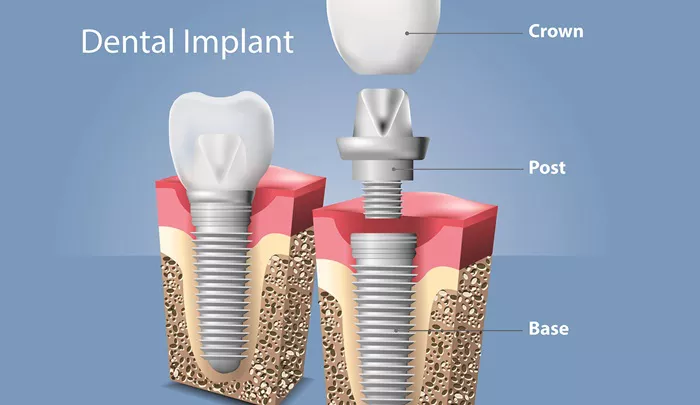Mini dental implants (MDIs) have become an attractive option for many patients seeking dental restoration due to their less invasive procedure, lower cost, and shorter recovery time. However, while MDIs have their advantages, they are not without their drawbacks. This article will delve into the disadvantages of mini dental implants, providing a comprehensive overview for those considering this dental solution.
What Is The Downside of Mini Dental Implants?
Limited Strength and Durability
One of the primary disadvantages of mini dental implants is their limited strength and durability compared to traditional dental implants. MDIs are typically less than 3 millimeters in diameter, making them significantly smaller than conventional implants. This smaller size can impact their ability to withstand the biting and chewing forces exerted on them over time. As a result, MDIs may be more prone to bending or fracturing under pressure, particularly in patients with strong bite forces or those who grind their teeth.
Restricted Application
Mini dental implants are not suitable for all dental restoration needs. They are most commonly used for stabilizing dentures or replacing small teeth, such as incisors. Due to their reduced size and strength, MDIs are not recommended for larger teeth or for areas where high bite forces are present, such as the molars. This limitation can restrict their use in patients who require comprehensive dental restoration or those who have lost multiple large teeth.
See Also: Which Country Has Cheapest Dental Implants
Bone Density and Volume Requirements
The success of any dental implant, including MDIs, relies heavily on the quality and quantity of the patient’s jawbone.
While MDIs can be an option for patients with lower bone density, they still require sufficient bone volume to ensure stability. In cases where the jawbone has significantly deteriorated, bone grafting procedures may still be necessary to provide a suitable foundation for the implants. This requirement can add complexity, time, and cost to the treatment process.
Potential for Higher Failure Rates
Research indicates that mini dental implants may have higher failure rates compared to traditional implants. Factors contributing to this increased risk include their smaller size, which may compromise their stability and integration with the bone, and the possibility of overloading the implants due to inadequate support. Patients with habits such as bruxism (teeth grinding) or those with poor oral hygiene may face an elevated risk of implant failure.
Aesthetic Limitations
Aesthetic outcomes are a crucial consideration for many dental implant patients. Due to their smaller size, mini dental implants may not always provide the same level of aesthetic results as traditional implants. The reduced diameter of MDIs can affect the way the prosthetic tooth is attached, potentially leading to less natural-looking results. Additionally, the use of MDIs in the front of the mouth, where aesthetics are paramount, may not always achieve the desired visual outcome.
Prosthetic Attachment Challenges
The attachment of prosthetic teeth or dentures to mini dental implants can present challenges. The smaller size of MDIs means they may not provide as secure a connection as traditional implants. This can result in issues such as the prosthetic becoming loose or unstable over time, which can compromise both function and comfort. Regular adjustments or replacements may be necessary to maintain the desired fit and stability.
Limited Long-Term Data
While mini dental implants have been in use for several years, there is still a relative lack of long-term data compared to traditional implants. The long-term success and complications associated with MDIs are not as well-documented, making it more challenging for dental professionals to predict their longevity and overall performance. Patients considering MDIs should be aware of this limitation and discuss it with their dental provider.
Higher Per-Unit Cost
Although the overall cost of mini dental implants can be lower due to the less invasive procedure and reduced need for bone grafting, the per-unit cost of MDIs can sometimes be higher than traditional implants. This is because MDIs are typically used in greater numbers to achieve the desired stability and support, particularly for denture stabilization. Patients should consider the total cost of the treatment, including the number of implants required, when evaluating their options.
Potential for Increased Maintenance
Patients with mini dental implants may require more frequent maintenance and follow-up care compared to those with traditional implants. The smaller size and potential for stability issues mean that regular check-ups are essential to ensure the implants remain functional and to address any complications promptly. This increased need for maintenance can add to the long-term cost and inconvenience for patients.
Conclusion
Mini dental implants offer a viable solution for certain dental res toration needs, particularly for patients looking for a less invasive and cost-effective option. However, it is crucial to understand the potential downsides associated with MDIs.
Limited strength and durability, restricted application, bone density requirements, potential for higher failure rates, aesthetic limitations, prosthetic attachment challenges, limited long-term data, higher per-unit cost, and the need for increased maintenance are all factors that should be carefully considered. Consulting with a dental professional to thoroughly evaluate the suitability of mini dental implants for individual cases is essential to achieving the best possible outcome.

